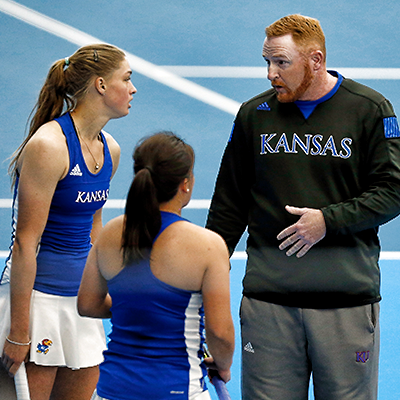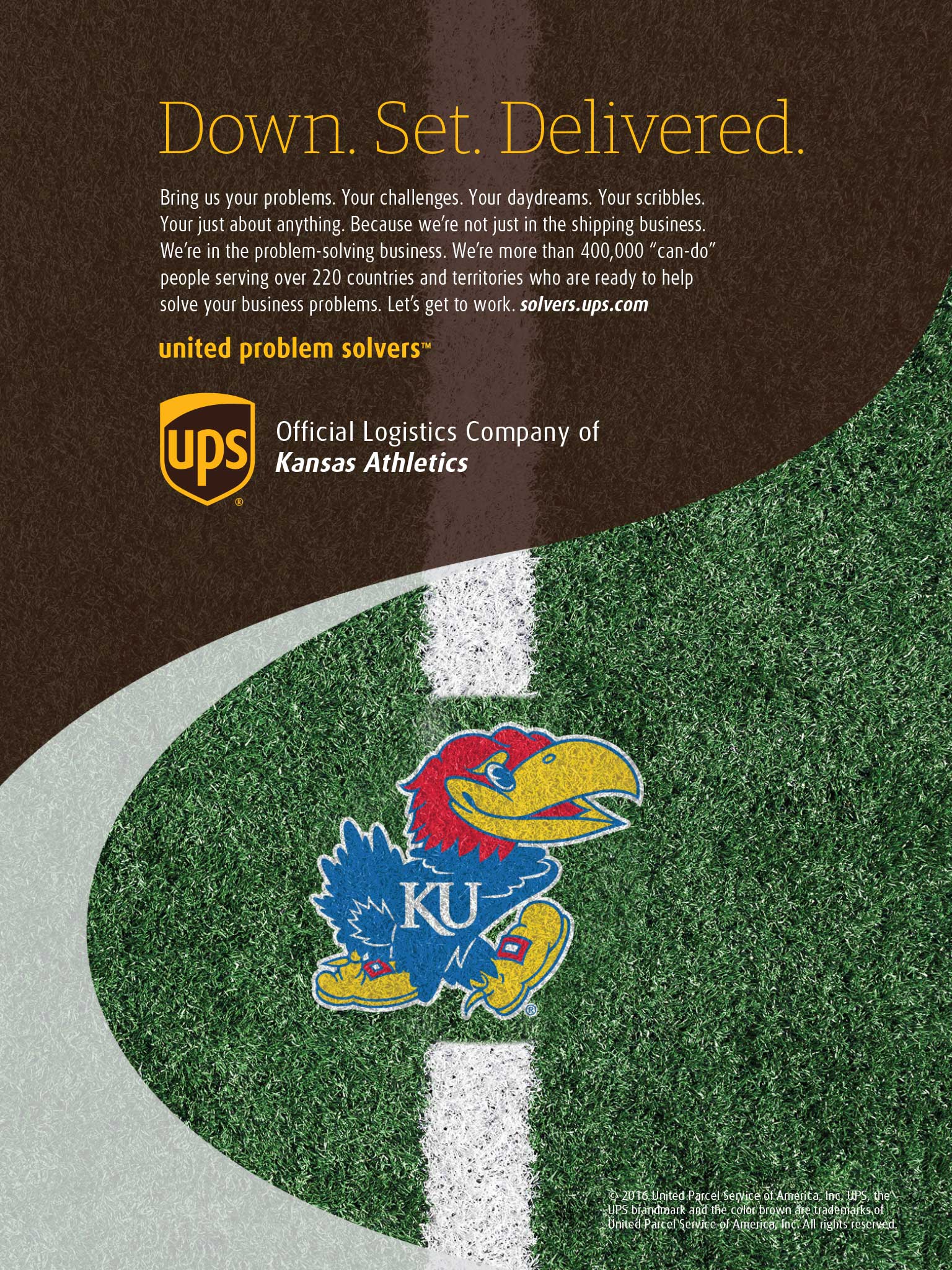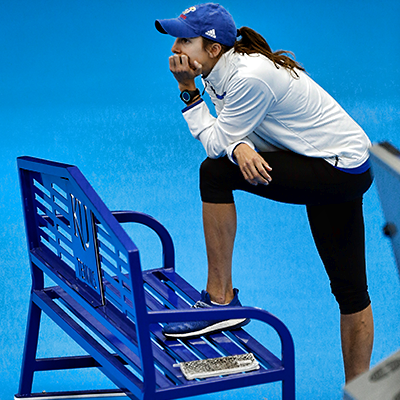RCW: From Injury to Impact
 Adopted from Nanning, China and raised in New York, senior transfer Tess Bernard-Feigenbaum never thought she would end up in Kansas.
Adopted from Nanning, China and raised in New York, senior transfer Tess Bernard-Feigenbaum never thought she would end up in Kansas.
Bernard-Feigenbaum first picked up a tennis racket at the age of six, it wasn’t until age 12 when things got serious. She had always played other sports, namely soccer, but with encouragement from her grandma and dad, she chose tennis.
“My dad played in high school,” said Bernard-Feigenbaum. “He saw me playing, saw that I liked it and thought I should continue with it. I started playing in national tournaments and it just kind of took off from there.”
At the age of 15, Bernard-Feigenbaum left her home in New York to train at the Weil Tennis Academy in Ojai, California, just northwest of Los Angeles. However, she wasn’t alone. The New York native had her mom and sister along for the ride. After two years in Southern California, Bernard-Feigenbaum decided it was time to return home to train at the brand-new John McEnroe Tennis Academy.
“When I left New York, there wasn’t a place that had really good training,” said Bernard-Feigenbaum. “During my senior year (of high school), that’s when John McEnroe started developing this program. I told my dad I wanted to be back home for my senior year.”
The first talk of earning a scholarship to play tennis collegiately came when Bernard-Feigenbaum was just 14 years old. When she was 16, Bernard-Feigenbaum and her dad began the recruiting process knowing that there was a large possibility she could attend college on a tennis scholarship. Bernard-Feigenbaum spent her childhood visiting family in Indiana, which put Purdue University on her radar very early.
“I committed there the beginning of my junior year,” said Bernard-Feigenbaum. “I knew one of the girls who was already there. I trained with her at Weil and she talked about how good of a school it was. I liked the coaches and it helped that she was there.”

During her freshman year at Purdue, Bernard-Feigenbaum initially crossed paths with Caroline Lilley. Lilley, fresh off her college tennis career with a business administration degree with a concentration in finance from Georgia Tech, took a position as a volunteer assistant coach at Purdue to test out the coaching waters.
“I knew one of the coaches on staff there,” said Lilley. “I kind of wanted to get my feet wet and figure out if coaching is really what I wanted to do. It was a really good opportunity for me to go to work with a great team, with a great coaching staff, where I could go learn a lot and figure out if coaching is really what I wanted to with my career.”
Lilley was a shoo-in for coaching, especially when it came to Bernard-Feigenbaum. Lilley spent almost every match standing at Bernard-Feigenbaum’s court helping and coaching her. From Lilley and the rest of the staff’s guidance, Bernard-Feigenbaum had a very successful freshman season. She clinched the highest-ranked road victory in Purdue history against No. 19 Notre Dame and secured the Boilermakers’ come-from-behind 4-3 win over No. 34 South Carolina in the first round of the NCAA Championship with a three-set win. Bernard-Feigenbaum won the first 10 singles matches of her career, ending the season with an impressive 24-2 singles record and an 18-3 doubles record.
“It was a seamless transition for Tess because she is incredibly talented,” said Lilley. “If you could find a way to help Tess manage her emotions and find a way to make her a great competitor, then you knew the level of tennis she was going to bring. The first time I saw Tess hit a tennis ball, I thought, ‘That girl can straight-up play.’ Her variety, her ability to change paces, her ability to impose her will and be aggressive, step inside the baseline, she has an unbelievably large skillset so it was fun coaching her because you could do so many different things.
“My job was to see if I could get Tess to be less emotional at times, or focused on the solution instead of the problem, and that’s what I got to see during her freshman year. Early on, she may have gotten angry when losing points, or frustrated, which is normal, but once she started to develop that skillset to manage those emotions, she really started to flourish and her game really started to flourish because she was free to play the style of tennis that she wanted to without the confines of feeling like all she had to do was win.”
After going 23-3 in singles and doubles in just the fall season of her freshman year, Bernard-Feigenbaum suffered a stress fracture on her hip, marking the beginning of a series of injuries. From the moment fall play ended until the beginning of spring, she did not touch a racket.
As her freshman year came to an end, Bernard-Feigenbaum began to experience soreness and pain in her right shoulder. As luck would have it, she had torn her labrum and had surgery that summer.

“I had a lot of support from the athletics training staff at Purdue and my dad,” said Bernard-Feigenbaum. “I knew I wanted to keep playing.”
Bernard-Feigenbaum wasn’t able to play during the fall season of her sophomore year, but came back in the spring of that year. She saw action from the No. 2 to No. 5 spots in singles to tally a 13-8 record, including winning nine out of 11 singles matches from February 16 to April 11.
During her junior year, Bernard-Feigenbaum led the team in total singles victories with 29, spring singles victories with 20 and tied for the team-high in doubles victories at 28. She paired with Daniela Vidal to earn a combined fall and spring record of 26-11. The duo appeared in eight of 11 ITA doubles rankings, climbed as high as No. 24, marking the program’s highest regular-season doubles ranking since 2007, and finished the season ranked at No. 47.
Ready for her senior year, Bernard-Feigenbaum began the fall by being invited to the Riviera/ITA All-American Championships where she competed in both singles and doubles. Bernard-Feigenbaum earned her highest ranking to date at No. 114 and upset No. 86 Sabrina Federici of Texas Tech. Following her upset, Bernard-Feigenbaum felt a familiar pain in her shoulder.
“I knew when it happened exactly,” said Bernard-Feigenbaum. “It felt exactly the same. I knew what it took to get back, but I was down because it was my senior year.”
Following her second labrum tear, Bernard-Feigenbaum took a medical redshirt and was granted an extra year of eligibility. She wanted to play for a program that was on the rise. But also, she wanted familiarity with the coaching staff. Bernard-Feigenbaum only had one year, so it was important for her to have that connection already established because she didn’t want to go somewhere she didn’t know anybody. That place was Kansas and Lilley, who is in the second year as an assistant coach with the Jayhawks.
“Once Tess asked for her release from Purdue, we got her release and got it approved through compliance,” said Lilley. “I contacted her and asked, ‘What are you thinking?’ I almost just contacted her to see where she was and kind of help her through the process, whether Kansas was where she wanted to be or not. I cared about her and I’ve known her for a long time, so it was important to me that she ended up somewhere that was going to be a really positive working environment for her, because I’ve always felt that she has unbelievable talent.

“In that first conversation, she said, ‘I’m really interested in Kansas because I know you, I know the team is getting a lot better and is heading in the right direction, it’s a development-oriented program.’ So we just started talking and obviously, I put her in touch with Todd (Chapman, Kansas head coach) and he had good conversations with her. She came on her official visit to meet the girls, she watched us compete and got a good feel for what we were looking for in players and what she was looking for and what was a good transition for her because it had been a year almost, by the time she got here in June, since her last time playing tennis.”
Bernard-Feigenbaum visited the first weekend of March 2016 and committed while she was in Lawrence. She knew when she came on the visit that Kansas was where she wanted to come if everything went well. Bernard-Feigenbaum signed in Chapman’s office and officially became a Jayhawk.
“When a player has one year left, I think they want to go somewhere where they know, or feel, they have a sense of comfort,” said Chapman. “A comfort level knowing they know a coach or someone on the team or maybe someone they trust a lot that knows a coach of that program really well so there is a sense of ‘I’m going to be treated really well. I’ve got only one year, so I can’t screw this up.’ You want your senior season to be the one that you look back on and think, ‘That was a good decision.'”
When Bernard-Feigenbaum arrived on the Kansas campus in June, she began summer school, conditioning and rehab all at once. She was immobile from surgery and needed to get back to where she could put her arm in the positions they needed to be to play tennis. Bernard-Feigenbaum worked with the training staff throughout the summer to improve her dexterity and flexibility not only as injury prevention, but also to continue to develop on the court.
During the summers, Chapman and the staff stress quality over quantity. The players do a lot of individual, short sessions that are high intensity. This involves an hour of tennis and an hour of conditioning with the training staff.

“We weren’t on the court as much,” said Bernard-Feigenbaum. “I think it helped slowly get me accustomed to playing again. It helped not put too much strain on my shoulder.”
After working hard throughout the summer, Bernard-Feigenbaum had lost 15 pounds.
“I don’t think her goal was to lose weight,” said Lilley. “I think it was to get back into tennis shape, but obviously she had to get back to her playing weight where she’s most mobile, but also strong.”
Coming off a year without tennis, she tallied a 9-4 singles mark and 9-5 doubles record in the fall. She was one of four Jayhawks to compete at the ITA All-American for the first time since 2007. Bernard-Feigenbaum collected four-consecutive wins at the ITA Central Regional where she also teamed up with Nina Khmelnitckaia to win five-straight doubles matches before falling in the title match.
“I think she has improved so much, just comparing her to the fall,” said Khmelnitckaia. “She is totally a different player. I am so proud of her, how much she worked, how hard she worked. I think she wants to work hard, she wants to get better and she makes us better.”
Bernard-Feigenbaum really started to feel comfortable this spring, namely in the beginning of February. She began to feel confidence in her game and in the way she was playing.
“I think that came with match toughness,” said Lilley. “She wasn’t happy with her fall results. She was like, ‘I’m not playing well.’ I explained to her that she wasn’t playing matches. You need to play matches, you need more matches under your belt, you need that experience. There were times she came into this office and said, ‘This is the hardest thing I have ever done. You guys push us so hard.’ But now she’s starting to see the rewards for her hard work.”

With six matches remaining in the spring season, Bernard-Feigenbaum has earned a career-high doubles ranking with partner Khmelnitckaia, coming in at No. 19 on February 8, as well as her highest ranked win against an opponent in Texas Tech’s No. 40 Felicity Maltby. Bernard-Feigenbaum won the match 7-6 (7-2), 7-6 (7-3), but was down 5-1 in the second set before rattling off four-straight sets to even the score, 5-5, which eventually led to her second-winning tiebreaker of the match.
“The piece that I think is really coming along right now on her tennis, especially in her singles, is her mental toughness,” said Chapman. “How tough she is on the court right now and also how competitive she is. Tess has always had the ability and now you add the piece of being in really good physical condition and also the competitiveness with which she’s playing. When you put those three things together, she’s a really tough opponent to beat at this point.
“That’s the really exciting part – she’s starting to play her best tennis that she has for the year, but she’s still not at her peak. There’s still levels of tennis that we can get out of her in the next couple of months. That’s fun to watch, that’s fun to see, it’s definitely fun to see it develop in front of you.”
Currently, Bernard-Feigenbaum is the No. 122-ranked player in the nation. She has tallied a 12-3 spring singles record and is on a seven-match win streak making her undefeated at the No. 2 spot. Bernard-Feigenbaum and Khmelnitckaia, the No. 55-ranked doubles pair, own a 12-4 record at the No. 1 spot, and are 18-7 overall.
“She (Khmelnitckaia) always has really good energy and I think it helps me to feed off of her energy,” said Bernard-Feigenbaum. “We just try to do the best that we can, give the best that we can, every time we’re out there.”

Outside of tennis, Bernard-Feigenbaum shows the team her other skills, cooking and baking. Bernard-Feigenbaum first started learning these crafts when she would visit her grandma in Indiana by preparing meals with her. Now, she invites the team over to her apartment in the Jayhawk Towers to cook for them and just hang out.
“They tell me what their favorite food is and I’ll look it up, a recipe online, and I’ll just make it from there,” said Bernard-Feigenbaum. “I’ve made Russian salads, Russian pancakes. You put the cheese, called Tvorog, in the batter with the flour.”
Bernard-Feigenbaum’s teammates enjoy her cooking and baking so much that they’ve brought up culinary school. Not only is it something she’s good at, but has a passion for. It’s allowed her to settle into being part of the team and they love it.
From the ups and downs of injuries and different schools, Bernard-Feigenbaum has always had someone with her to offer unconditional support, her dad. He travels to each home match and even some away matches to watch his daughter to compete, and excel in, a sport he once played in high school.
“When I see him, I just want to do well,” said Bernard-Feigenbaum. “He’s always been a big support system and I’m grateful for him and everything he’s done.”
From training across the country, three injuries and two teams, Bernard-Feigenbaum has already made an impact on the Jayhawks and isn’t done yet.

